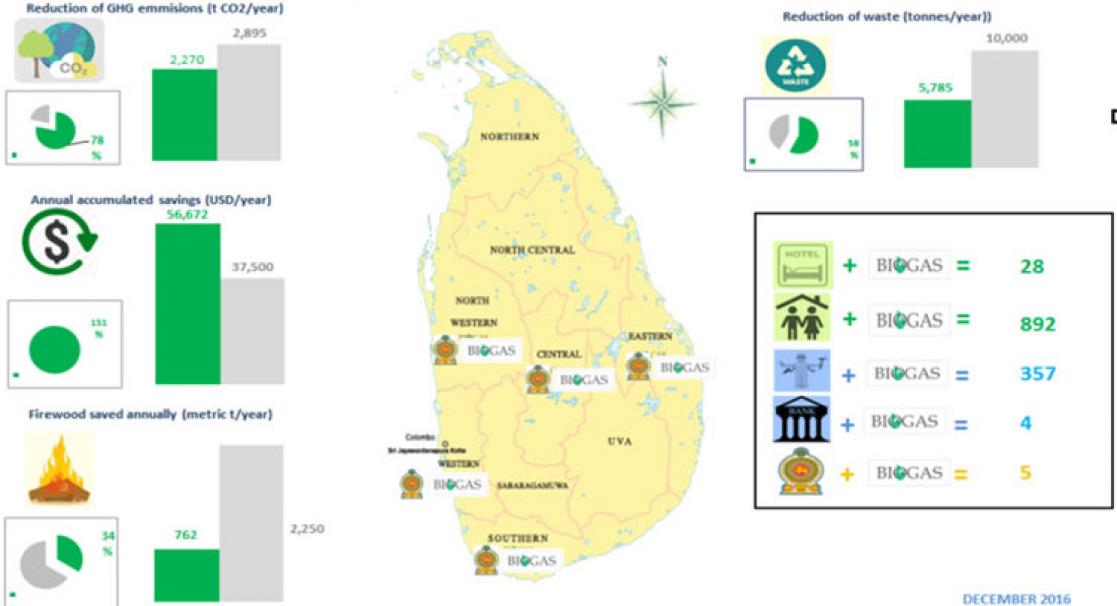SWITCH Asia Sustainable Consumption and Production National Policy Support Component for Sri Lanka
The purpose of this contract is to strengthen the institutional policy framework ensuring a joint and effective SCP effort in Sri Lanka.
Total Cost (EUR): 1 867 500
EU contracted amount (EUR): 1 867 500
Duration: December 2014 - December 2018
Implementing organisation: APPLICATION EUROPEENNE DE TECHNOLOGIES ET DE SERVICES SARL
Funding Instrument: DCI - Environment and sustainable management of natural resources including energy
Benefitting zone: Sri Lanka
STORY: SWITCH Asia: Sustainable Consumption and Production National Policy Support Component for Sri Lanka

"Overhead costs in managing our hotel waste have been reduced. I am happy to have made the move to being more ecological and I would recommend this form of energy to other hotel owners."
Proprietor of Riviera Resort Ebenezer Devadarshan
CONTEXT
The island nation of Sri Lanka is small, predominantly rural with a high population density. Like many countries, this combination has resulted in friction between the ambition towards economic development and the need for conservation of environment. Sri Lanka faces a flurry of problems with regards to environment including overuse of resources, land degradation, deforestation, waste management etc. It is against this backdrop that the project with the NGO People in Need was initiated.
OBJECTIVES
- To support the Sri Lankan Government in selecting, adapting and implementing suitable economic and regulatory policy instruments to promote SCP, thereby enhancing the long-term sustainability of consumption and production partterns;
- The purpose of this contract is to strengthen the institutional policy framework ensuring a joint and effective SCP effort in Sri Lanka.
RESULTS
- Project office fully operational and adequately staffed;
- Modalities for day-to-day collaboration with project component counterparts established and operational;
- Project team is fully familiar with previous / on-going projects and relevant sector strategies;
- Appropriate structure and mechanisms for inter-institutional coordination and stakeholders' consultation is in place;
- Seminar/consultation workshops held for representatives of all key project beneficiaries; all stakeholders informed of the purpose of the project;
- Project Steering Committee (PSC) set-up and one meeting of the PSC held to present Inception Report and action plan.
TESTIMONY
Ecological initiative for Riviera Resort

The goal of the project has been to create an enabling environment for a large-scale dissemination of biogas as a solution for waste management and a reliable source of clean energy for SMEs and households in Sri Lanka. The tourist industry, known for being energy intensive and creating waste, has been one of the main beneficiaries of this project. One such new user of biogas is Hotel Riviera, located in the previously war ravaged district of Batticoloa. With its pristine façade, chalets around the lagoon and with a distinct surrounding charm of a fishing village, the hotel applied the usual practice of waste disposal through burying its waste in the large resort grounds. However with more post-war tourism, expansion of its existing 12 cabins was inevitable, and thereby a the need for better disposal of its waste grew. Following a Micro Small and Medium Enterprise training provided by the project, a biogas unit was built at the hotel. The newly constructed unit was fed with garden and kitchen waste. Since the building of this unit, not only is waste disposal environmentally friendly but also the gas produced is sufficient for one burner stove that can be used for three hours a day. Proprietor of Riviera Resort Ebenezer Devadarshan on the shift from burying waste to using biogas said 'Overhead costs in managing our hotel waste have been reduced. I am happy to have made the move to being more ecological and I would recommend this form of energy to other hotel owners'. What however took everyone by surprise was the use of slurry. Along with the biogas unit, a slurry was built which produced organic char from the waste that the hotel produced. This char is now being used for the hotel's vegetable, spice and fruit cultivation patches! As a technology, biogas is able to address not just growing energy needs and contribute to the reduction of greenhouse gases, but also is a solution for management of waste which at present one of Sri Lanka's greatest challenges and threats to the environment. Moreover biogas has the potential to be used as an organic fertilizer too. Availability of sustainable, clean and reliable sources of energy is an essential driver for development. The shift in thought process, in individual responsibility toward the planet and in accepting change has been remarkable and partly possible due to the EU-PIN project's intervention.
FACTS AND FIGURES
- 924 awareness raising events organized
